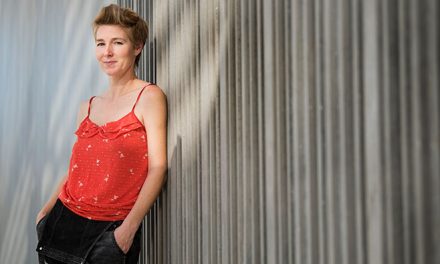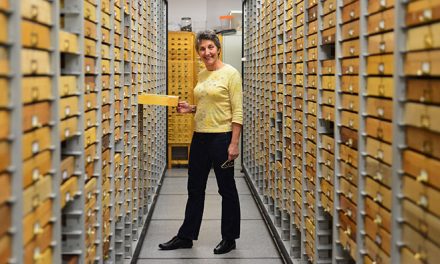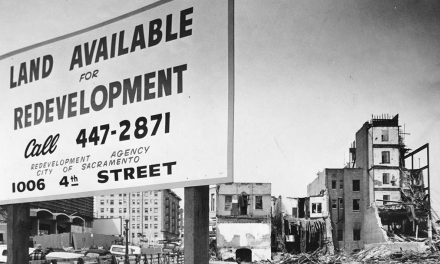Clearing a Path
Women show the impact of mentorship across a variety of fields.
Collective Knowledge
Becoming a doctor is a decade-long commitment, and having someone to look up to helps a lot. If that person has something in common with you — even better.
When Alicia Gonzalez-Flores, now an internist at UC Davis, became chief resident in her internal medicine program in 2013, she was thought to be the first woman of color to hold the important position. “At that point, there was only one attending [physician] that I worked with who was underrepresented,” she said. “I don’t recall there being someone else who was not the usual suspects.”
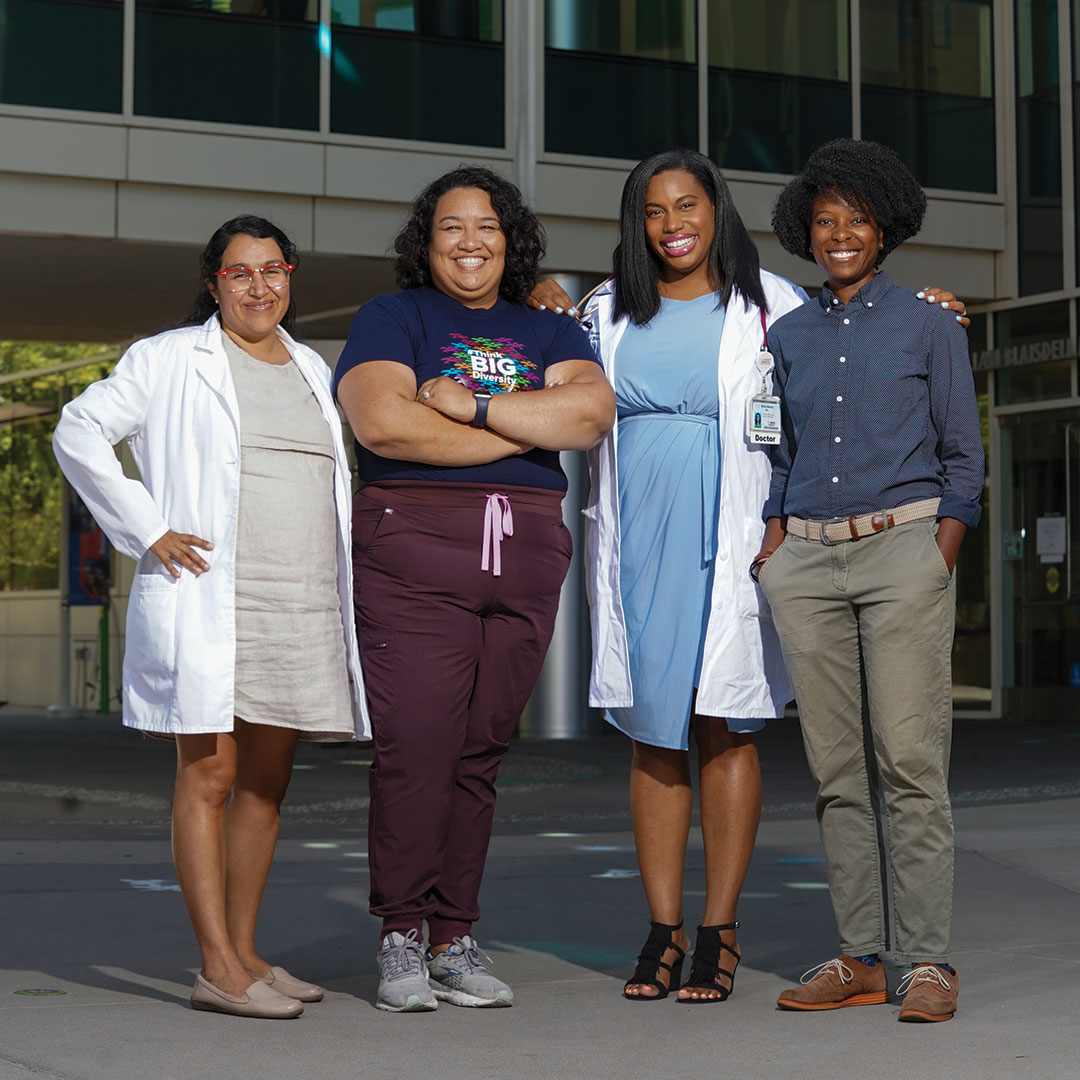
From left: Alicia Gonzalez-Flores, Olivia Campa, M.D. ’14, Elise Boykin-Harris, M.D. ’18, and Tamika Coy on the UC Davis Health campus in Sacramento. (Photo: Karin Higgins / UC Davis)
In the nine years since, Olivia Campa, M.D. ’14, Tamika Coy and Elise Boykin-Harris, M.D. ’18 — all women of color and now physicians at UC Davis — have held the position of chief resident. And they count each other as mentors.
“The chiefs tend to mentor each other because it’s a very unique position that only chiefs can truly understand,” said Coy, who now practices at a Sacramento County clinic. “So you have to pass the baton and prep people for what they’re in for.”
In their final year of training, chief residents take on additional administrative and leadership duties, and are considered junior faculty among colleagues. The position goes to those who do well in their program and have demonstrated the necessary skills.
As women of color, they said mentorship is vital in their demanding field.
“Part of it is because we really like each other, but the other part is it’s important, especially for women of color, to be really successful, to be leaders, and to be changemakers,” said Campa, who is a primary care physician and assistant clinical professor at the School of Medicine. “They also have to understand what that takes and how hard it is, and how much burden is put on you as an individual but also how important it is for patients and the next generation of doctors.”
Campa added that when she mentors others, she is all-encompassing, providing advice on everything from negotiating to contracts. She received the Young Alumna Award from the Cal Aggie Alumni Association last year, in part, due to her efforts in mentorship.
Boykin-Harris, the youngest of the group, finished her residency this year and credited Campa with helping her find and secure a job in a Sacramento clinic, where she started this summer.
“Olivia’s the reason I have the job I have now,” she said. “It went beyond teaching and residency, but getting the job, opening doors.”
“I like teaching and mentoring others. Realizing I could play that role for other students was eye-opening for me.”
— Alicia Gonzalez-Flores
And though all four women excelled in the internal medicine program, the decision to become a doctor wasn’t an easy one to make.
Boykin-Harris enjoyed learning about anatomy as early as 6 years old, but her parents didn’t have backgrounds in science, and she wasn’t sure what she would do with her biology degree until a professor encouraged her to take the MCAT, the medical school entrance exam.
Coy said the idea crossed her mind, but she thought it was impossible.
“I can only remember having one Black doctor my entire life — my pediatrician, who I loved,” she said. “I think he was the only person of color who treated me in a clinic setting. I thought it would be so cool if I could do this type of work, and then I just thought it probably wasn’t something I could do.”
All four said they discovered the possibilities in college. For Coy and Gonzalez-Flores, it was a friend and fellow classmate who offered encouragement. For Campa, it was her boss when she worked in a UCLA research program.
“She looked at me one day and said, ‘You’ve got to become a doctor. You are too talented for another profession,’” Campa said. “I had no idea what it took to be a doctor, but I really admired her, and her telling me that was very impactful for me.”
All four emphasized that a mentor can be anyone.
“I’ve had some amazing mentors that look like me, but I’ve also had some amazing mentors that didn’t look like me,” Boykin-Harris said. “They cared enough about me to push me forward.”
Looking back, Gonzalez-Flores said many people had helped get her to where she is now. More than one person shared their knowledge, offered advice and helped her get to the next level.
And though academic medicine is still working through diversity issues, Gonzalez-Flores said she sees improvements. In addition to being a primary care doctor in Sacramento, Gonzalez-Flores leads training programs for students interested in primary care at the School of Medicine.
“I like teaching and mentoring others,” she said. “Realizing I could play that role for other students was eye-opening for me.”
Role Modeling
Kristen Barnhisel, MS ’99, started learning about the wine industry when she was still in elementary school. She was astounded by how interconnected it is.
“Six degrees of separation? I always think it’s like, two in the wine industry,” Barnhisel said. “It’s important to network and build that network for sure. … That’s your foundation for heading out into the industry.”
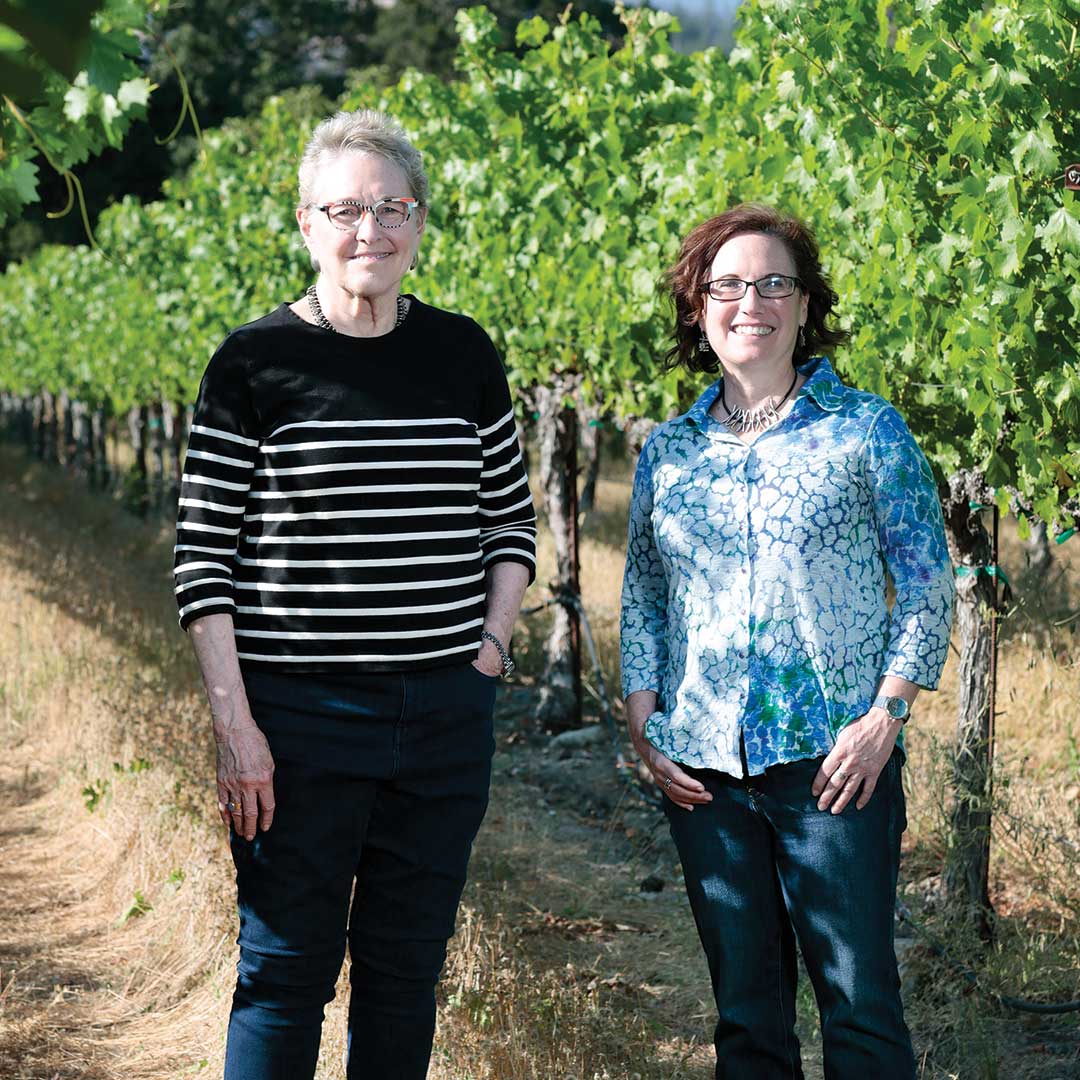
Zelma Long, Ph.D. ’20, left, stands with Kristen Barnhisel, M.S. ’99, at Warnecke Vineyard in Healdsburg, California. (Photo: Ramin Rahimian for UC Davis)
Her early exposure to the wine industry came from spending time at her mom’s workplace — her mother was a microbiologist for Simi Winery — and with the person who hired her mom, longtime winemaker Zelma Long.
“I’ve probably known her since I was about 9 years old,” she said of Long, Ph.D. ’20, who has spent five decades in the wine industry and said she always makes sure to help interns and other people just starting out their careers.
“I believe it’s important,” Long said. “When you have a skill, you pay it forward.”
After leaving UC Davis partway through a master’s degree in enology to work at Robert Mondavi Winery, Long quickly discovered the value of sharing knowledge.
She formed an informal lunch group with eight to 10 winemakers, which later turned into the North Coast Viticulture Research Group, focused on advancing their own scientific knowledge on growing wine grapes by studying things like soil conditions.
While Long said she sees the wine industry as more competitive than it was decades ago, she noted it’s still an ideal place for interns and young professionals hungry for guidance because of how the workload swells each year when grapes are harvested.
Barnhisel’s first winery job came at 18, but she wasn’t sure she would follow in her mom’s footsteps until she studied abroad in Italy as part of an undergraduate degree in Italian literature.
“That’s when I really fell in love with it,” she said of wine. “In Italy I saw it as a conduit to conversation and part of the meal. It brings people together.”
Whenever she came to Sonoma County for holidays, she would meet up with Long to catch up and get advice. One of her big tips: travel to learn from others.
“When you have a skill, you pay it forward.”
— Zelma Long
“Her recommendation was just go and explore,” Barnhisel said, recalling a decision of whether to move to Washington for a job with Columbia Crest Winery — her first job after graduating from UC Davis. “Learn something, and then you can always come back.”
Barnhisel took that advice to heart, moving to Washington and later spending time making wine in Italy and at Long’s winery in South Africa, where Long said the winery hires a combination of local and international staff members.
“There are a lot of magical opportunities that come with travel and education,” Long said.
The pair has even traveled together, going to Ireland for Barnhisel’s mother’s 85th birthday — and working together to select a wine list for the celebratory dinner. Most recently, on an April trip to Piedmont, Italy, they observed unique aging techniques with the native Nebbiolo grapes.
Another tip Long has emphasized over the years: Keep learning about the science behind winemaking.
“The scientific base I learned at UC Davis and continue to gain … is how I continue to make the artwork that is winemaking,” said Barnhisel, who has served as president and is now a board member for the American Society for Enology and Viticulture. “You have to be able to understand the science behind it.”
Long has sought to continue her own education, and has funded UC Davis research through her North Coast Viticulture Research Group. She never completed her enology degree, but in 2020 earned a Ph.D. in performance studies with a designated emphasis in Native American studies. She focused on the performance of art in families of artists; her dissertation studied a six-generation family of Hopi-Tewa artists.
She said she’ll continue to help young winemakers, especially women.
“I think that helping young people get where they want to go is really important because these high school and college students are going to be the next generation,” Long said.
In her current position at J. Lohr’s Greenfield winery, Barnhisel has become a mentor in her own right, training and teaching staffers about such topics as winemaking history and science.
“As much as I’m curious about wanting to learn more, it’s great to share that info too,” she said.
Mutual Interests
Mentors can and should learn from their mentees, two UC Davis faculty members agreed.
Tessa Hill and Alyssa Griffin officially became colleagues in the Department of Earth and Planetary Sciences this summer when Griffin was hired as an assistant professor, but both said their mentor-mentee relationship has been like one of peers ever since Griffin joined Hill’s Ocean Climate Lab in 2020 as a Chancellor’s Postdoctoral Fellow.
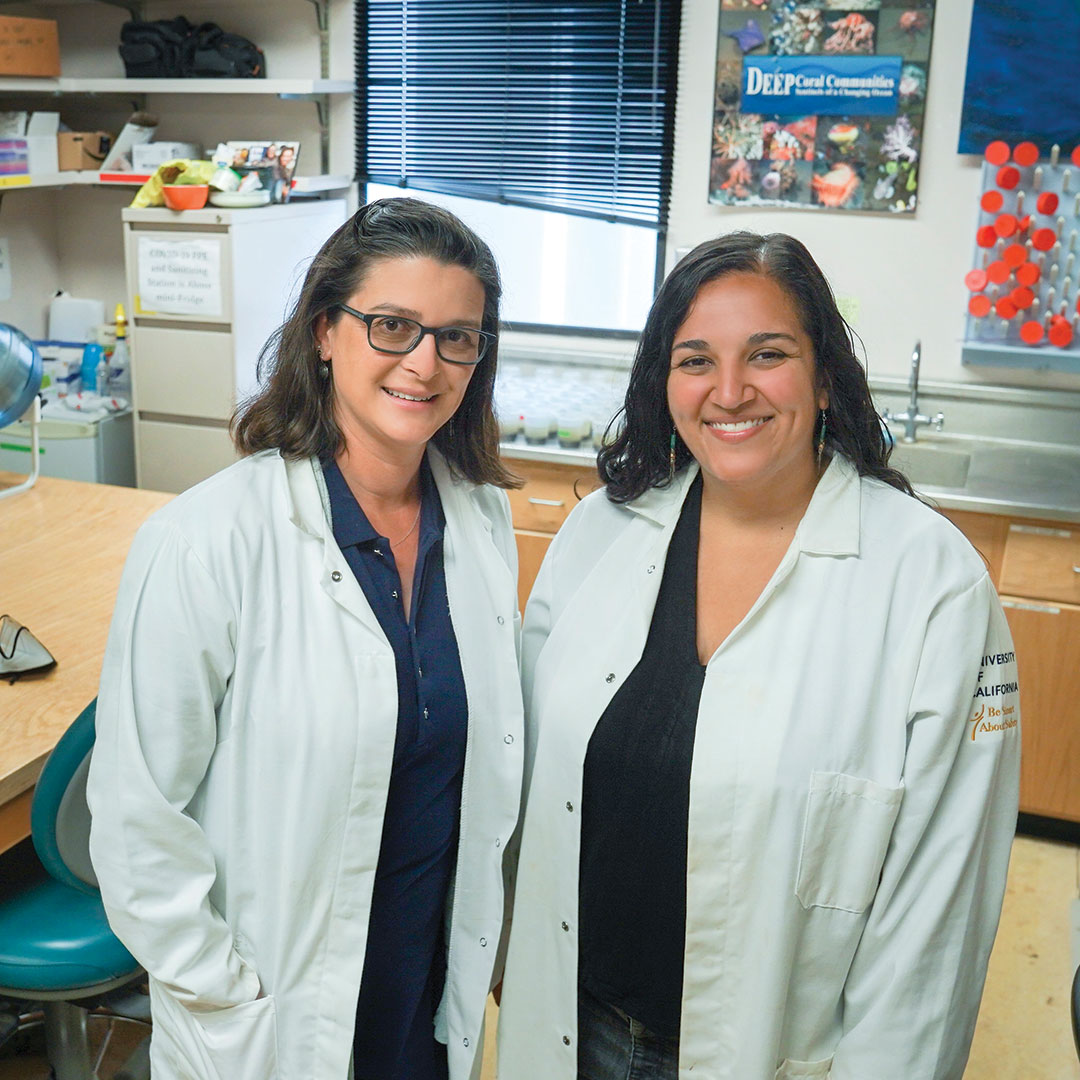
Tessa Hill, pictured, left, and Alyssa Griffin at the UC Davis Bodega Marine Laboratory. (Photo: Karin Higgins / UC Davis)
“Tessa really approached me as more of a colleague than someone who is in a lower position or junior position to her,” Griffin said. “It made a world of difference. … It instilled a lot of confidence in me: ‘If Tessa has confidence in me, I should have confidence in myself too.’”
Hill, a professor in the same department and associate vice provost of academic programs with the Office of Public Scholarship and Engagement, said she has “learned a lot” from Griffin in the two and a half years they’ve worked together.
“It’s had a mutual benefit, which is what all good mentoring relationships are like — they go both directions,” Hill said.
In particular, Griffin’s biogeochemistry expertise, focused on changes in ocean chemistry and acidification, along with her work with marginalized communities affected by environmental contamination, brought new skills to Hill’s lab.
They recalled a project in which Griffin worked with another lab member, Carina Fish, to help people in Bayview-Hunters Point, a majority-minority community in San Francisco, get independent testing of coastal waters and soils.
“A lot of mentors don’t value that type of work, but because Tessa is open and eager to also use science to advocate for people, I think she created a space for me to really pursue [it],” Griffin said, noting that she hopes to continue to find new ways to use science to help people.
Hill cited that project as an example of the importance of including diverse voices in science.
“Her knowledge and her expertise and her interest in pursuing those questions [about how pollution impacts communities of color] brings new perspective to the university,” Hill said, noting the importance of a diversity of backgrounds. “If we do science in a way that only mentors or supports one kind of student, we’re missing out on a tremendous amount of scientific discovery.”
Researchers can continue to encourage a variety of viewpoints in science by embracing a varied approach to mentorship, she added.
“It’s had a mutual benefit, which is what all good mentoring relationships are like — they go both directions.”
— Tessa Hill
While she is “eternally grateful” to Hill for her mentorship, Griffin said she attributes her desire for more than one mentor to her heritage.
“As a woman of color, there are things and experiences that I might not go to Tessa for because she has different lived experiences than me,” Griffin said.
Hill isn’t offended — she encourages people to have multiple mentors and continues to seek out mentorship for herself.
“I subscribe to a ‘mentoring web’ model where students and postdocs and researchers and faculty of all ranks — all of those folks — benefit from having a web of people around them who support them in different ways and who they can call on for different things,” Hill said.
Not only does a group of mentors with varied expertise help the mentee grow even more, but it also protects them from a single mentor giving bad advice or creating a toxic relationship, Hill said. She noted that a web of mentorship relationships makes even more sense at a place like UC Davis, where collaboration is paramount. It also helps to better support a diverse student population, she said.
“In order for us to serve the diversity of students — both undergraduate and graduate students — who are coming into the university, we really have to think about which of these models work well and assume that one model of how mentors and mentees work is not going to work for everybody,” Hill said. “The model — one senior and one junior — might have been the predominant model 30 to 50 years ago, but is it going to serve the full range of people that the university is trying to serve?”
Hill and Griffin both said they’re looking forward to continuing their relationship together.
“I get to work with her forever now,” Hill said of Griffin’s new position in the department. “I feel lucky because she’s the kind of person I would want to have as a colleague forever.”
Griffin joked that Hill was “stuck” with her now that she has a tenure-track position in the same department.
“I hope and think we’re going to do amazing things,” Griffin said. “I feel super supported by her, and I hope she feels the same from me. … I hope we can continue supporting each other and do cool, impactful science.”

